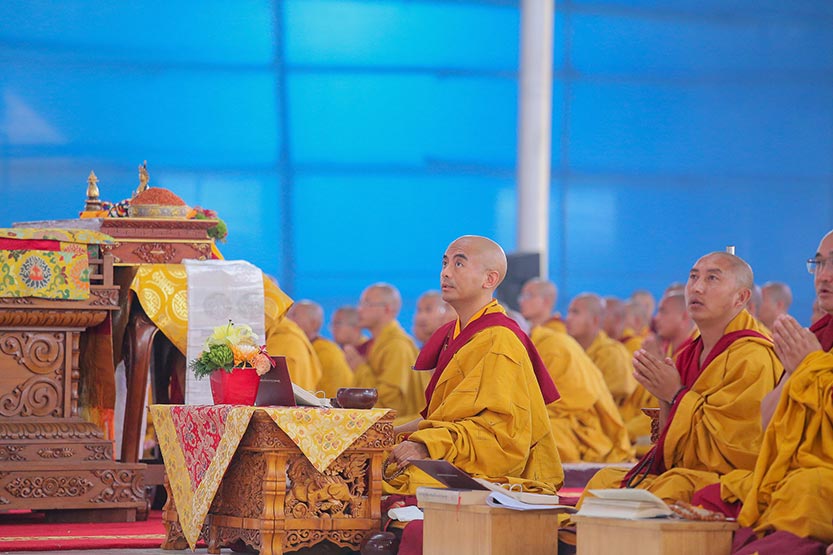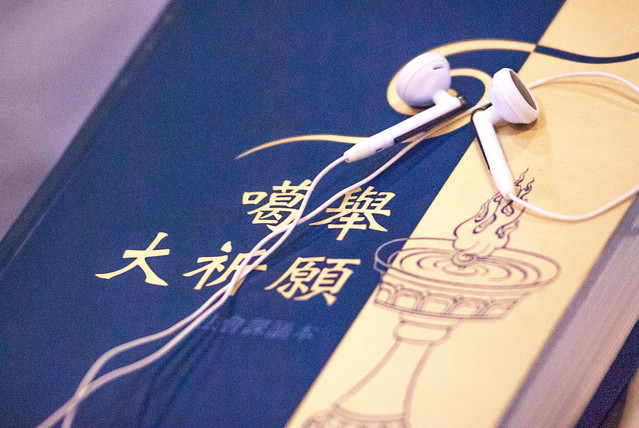
His Holiness greeted the assembled Rinpoches, monastics and lay students before returning to the previous day’s topic, inauthentic or misguided dharma practice.
In Geshe Potowa’s understanding, the term “assertive” should apply to someone with fortitude, skilled in accomplishing the path to enlightenment. His Holiness said that a “learned” person should not be a sweet talker but someone who knows “what should be taken up and what should be given up according to the dharma and practicing it as you know it.” He continued, “learned” means knowing the dharma, “venerable” means keeping your vows, and “good” means conduct in accord with the Abidharma, sutras and Vinaya —someone engaged in the three trainings of listening, contemplating, and meditating. A practitioner whose mind was still wild had not engaged in the three trainings properly. He commented, “All dharma is to be practiced. There is not even a single letter that is not meant to be practiced.”
His Holiness delivered a cautionary teaching, emphasizing the wrong views discussed by Geshe Potowa. First, many people say that they have one pith instruction to practice, and they become complacent. But why would the Buddha teach 84,000 kinds of dharma if one short instruction were sufficient? He noted, “Generally to achieve enlightenment—buddhahood—you must never think you have had enough.” Transformation through dharma practice is not as easy as a snake shedding its old skin. His Holiness emphasized, “We should be insatiable about learning and never get complacent about our practice for achieving buddhahood. Potowa is saying we should practice all the dharma.”
Another prevalent wrong view is the tendency toward bias. We tend to cling to our own group or lineage, thinking it is the best one. The Karmapa commented, “Having such a bias is not appropriate, even in a dream.” We are getting closer to death every moment. Now is our chance to achieve liberation. “If we do not do whatever we can to free ourselves from samsara, we will cycle through it over and over again, like a windlass spinning—in brief, continuously. This is certain.”
In order to free ourselves, we need to care about others rather than denigrating them— we must generate both aspirational and engaged bodhicitta. It is not enough to arouse the wish for sentient beings to be happy; we must actually help them. His Holiness continued:
The causes and conditions you need to develop are the four immeasurables without any bias toward any sentient beings. Pretending that you can achieve buddhahood without even developing the four immeasurables is fooling others and fooling yourself.
He reminded the audience of the Buddha’s prediction that his teachings would be destroyed not by demons or enemies, but by strife and factionalism among his followers in the sangha, beset by their afflictions.
The next caution was about the use of social media:
In the past we had conversations with our friends and acquaintances. Now we send them out over social media to all sorts of people. There are many messages that denigrate great beings or that denigrate dharma lineages. Even if we don’t normally feel bias, when we get involved in that we develop bias and attachment. When that happens, we get into conflict, and that eventually becomes the cause for destroying the teachings.
His Holiness emphasized that we cannot know someone else’s intentions, so we tend to project our own states of mind onto them. But our perceptions are unreliable and can easily deceive us. For example, Marpa seemingly tormented his devoted student, Milarepa. The Karmapa commented:
These days if there were a lama like Marpa, it all would have been posted to WeChat Moments. ‘Marpa did this today. He did that today.’ Marpa would have been unable to show his face.
Geshe Potowa is cautioning us: be careful about judging others.
Another mistaken view is the idea that wealth ensures independence and is thus useful for dharma practice. His Holiness observed wryly:
That is not good at all. If you say you can’t practice dharma now when you don’t have many resources, when you do have many resources there is the danger that you will only do wrong and not practice dharma. These days, the wealthier and more influential you get, the less dharma activity you accomplish and the stronger your accumulation of misdeeds becomes.
He continued by noting that competing to build the largest monastery or using the most gold and silver on the biggest statues is not true dharma; genuine dharma activity is doing whatever possible in order to get out of samsara. If we are really focused on our future lives rather than this one, we will be busy preparing for them and we won’t have time to accumulate wealth.
Yet another example of practitioners fooling themselves is the prevalent tendency to make long term plans. The Karmapa stated:
This is the same as lying to yourself. The reason is that we know that we will die soon. But we assuage ourselves saying, I’ll do this next year and that the year after. We don’t know whether we’ll be here next year, or the year after. But we comfort and deceive ourselves.
Geshe Potowa observes that many people work hard and undergo suffering for worldly results, while being unwilling to bear hardships in the dharma. His Holiness commented that here we need a qualified guru who can point out our faults and help us tackle them. As the text reads: When you meet a good guru, your mind will likely become the dharmakaya. The Karmapa criticized the idea that one can allow the afflictions to arise, seeing them while resting in emptiness, noting that for someone who can actually rest in emptiness, disturbing emotions would not actually occur. In conclusion, the Karmapa cautioned:
This is for all of us, and especially for all of us who are dharma practitioners. We need to examine our beings. We need to know what our mind stream is actually like. It should not be some conceit or something we hope to be, or some sort of a dream. That does not help. We need to see what our actual situation is. After we have examined ourselves and identified our bad points, then we need to do what we can to abandon them. It is important to keep this in mind.
The teaching on Geshe Potowa was over but the teaching itself was far from over, as His Holiness delivered a brief, moving, and strong caution about the motivations of his students — those at the Monlam and those not in attendance. In this address he manifested the qualities of the perfect lama Geshe Potowa describes: the lama who turns his students’ minds away from mistaken views and who helps them to move toward liberation.
The Karmapa began by saying that although his body is not in Bodhgaya this year, he feels that his mind is here, and he expressed delight and appreciation for those in attendance. Then he commented that some people did not attend the Monlam because of his absence:
That might be fine from one perspective, but from another perspective it is not all that good. The reason is that whether we need to practice the true dharma or not is a point that comes down to yourselves. You aren’t practicing dharma to keep me happy. If something is beneficial for you, then practicing it is your responsibility. You have to take responsibility for and accomplish your own purposes. The Kagyu Monlam is not a stage for me as an individual.
He noted that the 7th Karmapa, Chodrak Gyatso, initiated the Garchen (great encampment) in Tibet, and Kalu Rinpoche and Bokar Rinpoche brought it to India. The Monlam’s importance is not just in preserving tradition, though: “The main reason is the courage that comes from the Monlam.” Reciting the aspirations made by Buddhas and bodhisattvas of the past is deeply inspiring. Seeing what they were willing to go through on behalf of sentient beings gives us the courage to persevere, even despite the thousands of afflictions and challenges we face. His Holiness commented that “sattva” means “hero”, and the reason bodhisattvas are heroes is because
Benefiting other sentient beings is not easy. I’ve had some experience, and you have also had a fair amount of experience, about how difficult it is to benefit anyone in this life. And that is only bringing them temporary benefit and happiness. If we want to accomplish all benefits, both temporary and ultimate, yet we don’t have inconceivable courage, there’s no way we can accomplish it.
Such courage does not come spontaneously, without cause. At the Monlam, we take the buddhas and bodhisattvas as our example. His Holiness also encouraged us to read the life stories of past masters:
These are not myths. These lamas actually came into this human realm and were just like us.
They were born; they died. They were living beings. When we read their life stories, we think, ‘They were human, and they were able to do all that.’ We get inspired that we can be like them, if not the same as them. So please keep that in mind.
In ending such a strongly worded teaching on such a deeply encouraging note, His Holiness demonstrated his love and compassion for us, his students. He reminded us why we practice dharma, and what is to be gained. The chant master then directed the assembly to the Aspiration to the Stages of the Path, and the words rang out through the pavilion, charged with a renewed immediacy:
By gathering a mass of the two accumulations
As vast as space through long effort,
May I become a lord among buddhas,
A guide of all beings who are blinded by ignorance.
Throughout all my lives until that occurs,
May I be kindly cared for by Manjughosha,
Find the supreme path that includes all the dharma’s stages,
And please the buddhas through practice.


































